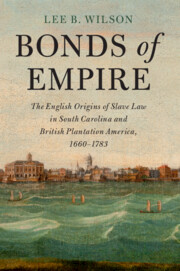 Bonds of Empire
Bonds of Empire 1 - Chattel
Published online by Cambridge University Press: 02 July 2021
Summary
Chapter One emphasizes the relationship between English property law and slavery. I follow colonists as they sought to classify slaves as property, and as they deployed their knowledge of English property law on a daily basis to manage slaves. Fitting slaves into an extant legal system that bifurcated property into real estate or chattels personal was an act with long-term practical consequences. American colonists – including those beyond plantation America – understood that each particular category unlocked different ways of proceeding at law that impacted their ability to buy and sell slaves and to shield them from creditors. Building upon customary practice in the transatlantic slave trade, South Carolina colonists treated enslaved people as chattel property, at first by custom and later via statute. Whereas most plantation colonies settled upon some mixture of chattel and real property when they determined how to classify their slaves, South Carolina colonists ultimately adopted pure chattel slavery in order to facilitate commercial transactions involving enslaved people and to expand their credit with British merchants. Treating slaves as a chattel property was economically beneficial for South Carolinians, but it had far-reaching cultural implications. Through close readings of legal forms, including marriage settlements, trusts, and wills, I also watch small acts of legal transformation, moments in which colonists analogized slaves to things. In these acts of legal transmutation, South Carolina colonists compared enslaved people to livestock and other valuable moveable objects, not because they believed them to be the same as those objects, but because they believed them to be the same at law.
Keywords
- Type
- Chapter
- Information
- Bonds of EmpireThe English Origins of Slave Law in South Carolina and British Plantation America, 1660–1783, pp. 29 - 68Publisher: Cambridge University PressPrint publication year: 2021
